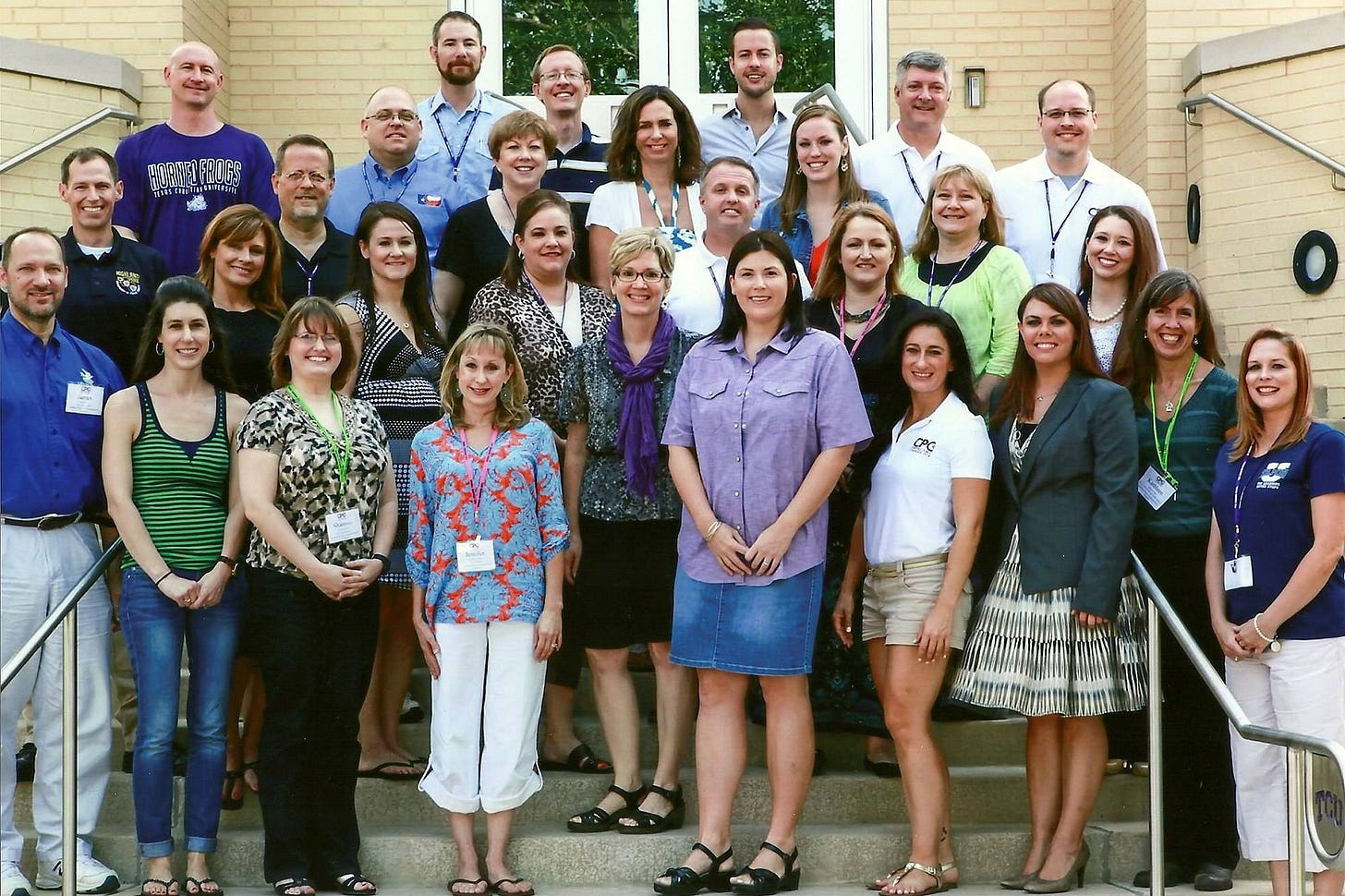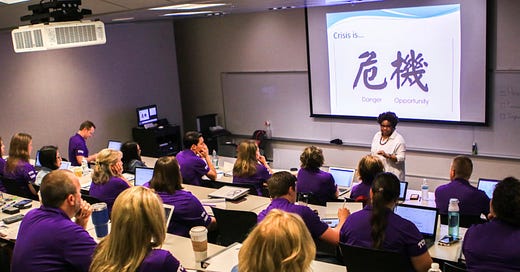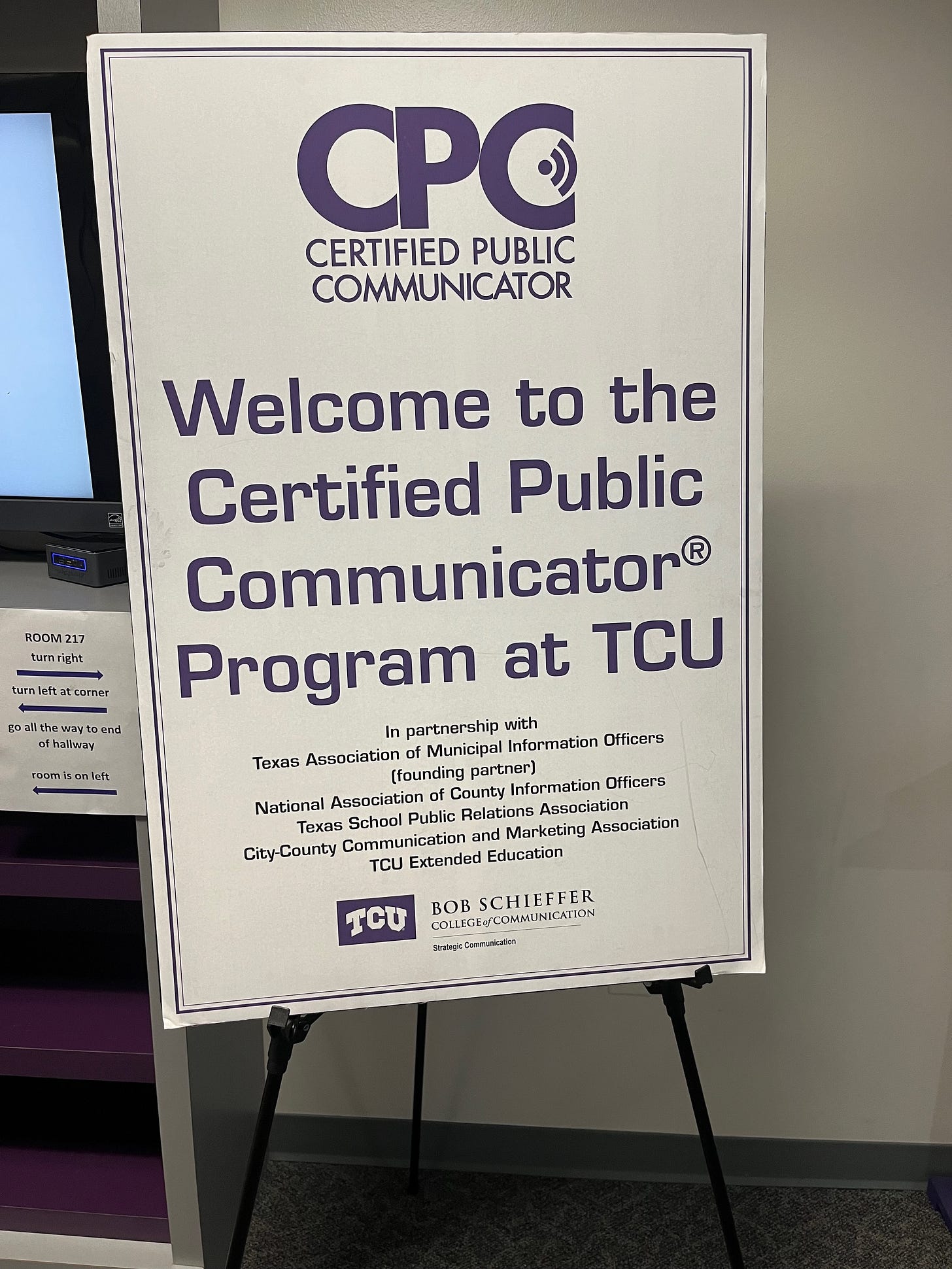Strategic Communication: Building Leaders, One Cohort at a Time
How TCU’s Certified Public Communicator® Program is Elevating Government Communication and Setting New Standards for Public Sector Professionals
My friend Michelle Bono, former comms goddess for the City of Tallahassee, Florida, put it best when describing communications as a core government function.
“This is not the icing on the cake,” Michelle said. “This is the cake.”
It’s a Good Government Files Truism that elected leaders can govern only as well as their constituents are informed. Keeping those constituents well-informed requires a mix of art, science, heart, and a deep understanding of the community’s needs. Effective communication isn’t just about delivering messages; it’s about crafting narratives that resonate, building trust through transparency, and effective citizen engagement. It’s about being strategic, responsive, and, above all, dedicated to the public good. In this three-part series, we’ll explore how the Certified Public Communicator® (CPC) program is shaping the future of government communications, starting with an in-depth look at the program itself.
CPC is a graduate-level program designed for public sector communication professionals. It includes two summer sessions and a winter session, offering intensive leadership training and education at the beautiful TCU campus in Fort Worth. The program is tailored for those working in cities, counties, school districts, and other public agencies, combining expert instruction from TCU faculty and industry professionals. Students graduate from the program with a three-year communication plan for their organization.
I’ve been a huge fan of the program from its inception. While I have not attended as a student, I did send two co-workers to the program — both of whom moved up in their careers, I believe, in part to having the CPC designation behind their names. Six years ago, I hired a CPC graduate to be my successor at the City of Round Rock, Texas.
Today, we’ll look at how the program started and what students learn with the help of Jacque Lambiase, the TCU communications professor who helped found CPC a decade ago. We’ll also be hearing from some of the more than 250 graduates of the program who now are by-God certified (®!) public communicators.
The Origins of the CPC Program
For those readers not in public service, certifications are a big deal in government work. In fact, they are a requirement for many positions. In addition to helping workers acquire new and updated skills, certifications provide formal recognition of expertise, which can enhance a resume, increase chances for promotions, and even lead to higher salaries. Programs like CPC also, importantly, expand one’s professional network. This is especially important in government work because there are no trade secrets — we readily, gladly share insights on what works and what doesn’t.
Until 2013, there was no certification program for public communicators. That changed when a small group of local government communicators from Texas approached Jacque, who had been a popular presenter at government communications conferences for a few years, and she was intrigued. She enlisted the help of Laura Bright, another (then) TCU comms professor, as well as board members from the Texas Association of Municipal Information Officers (TAMIO). Jacque and Laura were given a session at the annual TAMIO conference where they simply asked the professionals in attendance what they needed for advanced training. They listened, researched other certification programs, continued the conversation with TAMIO officers and the next year the first cohort arrived on the TCU campus.
One of those TAMIO officers and first cohort members was Tom Bryson, who worked for the City of Farmers Branch. Like many public information officers, Tom had previously worked as a journalist. That’s a profession great for learning how to craft stories, but lacks the full complement of skills needed to be an effective government communicator.
“Most of us that came from journalism learned how to cover government in school,” he said. “CPC taught us now to BE government, how to strategically approach the job without simply running from brush fire to brush fire.”
Belinda Willis of the City of Mansfield, also played a key role in the getting the program off the ground. She helped shape the curriculum to ensure attendees got the strategic planning chops they needed to better serve the public.
“Government communicators come from all segments of the media and communications field with invaluable expertise and skills,” Belinda said. “CPC takes those skills and enhances them for the public sector, helping them approach their work from a strategic perspective that strengthens what they can do for their communities and their organizations. It’s a game changer for our profession.”
The CPC program is structured over two summers, with a midwinter session. It includes 95 hours of in-class instruction. The first summer focuses on communication theory, covering public relations, marketing, leadership, listening, crisis communication, and more. Participants begin developing a strategic communication plan during this time. The midwinter session involves discussing and refining these plans. The second summer shifts to practical application, focusing on plan enactment, crisis management, and storytelling. The program concludes with a crisis exercise and a formal graduation ceremony.
Ironically, the program almost didn’t take at TCU. Ten years ago, there wasn’t a Bob Schieffer College of Communication. There was a Department of Journalism led by a former ink-stained wretch who took a dim view of government communicators, Jacque said.
“He did not like this idea and didn’t want it and was a journalist through and through and thought that people who were working as mouthpieces for cities, counties and school districts were bad people,” Jacque said.
Resourceful academician that she is, Jacque found a different dean to work with and enlisted the help of TCU’s director of Extended Education to work out some of the financial nuts and bolts of the program.
The first cohort included 28 local government communicators, all of whom were TAMIO members.

“It was 28 people who jumped into a brand new program that nobody really knew anything about,” Jacque says. “That took a lot of trust. And that was a great summer that we learned a lot. And we, I think, delivered good content from our wonderful faculty at TCU and from people beyond the campus.”
No doubt. The program has proven so popular with professionals from across the country, it’s gone from being well received … to a growing waitlist … to the need now for a competitive application process.
“The state of the program is really strong,” Jacque says. “We have a lot of enthusiasm from our cohorts, and we’ve seen many of our graduates move into significant leadership roles across the public sector.”
The CPC program has formal partnerships with TAMIO, the National Association of County Information Officers (NACIO), the Texas School Public Relations Association (TSPRA), and the City-County Communication and Marketing Association (3CMA). TAMIO, NACIO and 3CMA offer scholarships to their members to help cover the cost of tuition.
Core Components of the CPC Program
Let’s walk through a brief chronology of the coursework. It’s a lot, but I think the curriculum tells the story of the value students and their organizations receive for the $3,750 tuition.
Throughout their time on campus, the CPC program ensures that participants are not only gaining knowledge but also becoming part of a close-knit community.
“We really try to make them feel like TCU is their home,” Jacque says. “That’s why it’s a residential program. … It’s also, for want of a better term, a social capital program where people really meet a lot of other folks in a deeper way than they can at a conference.”
This sense of belonging, combined with rigorous academic instruction by an outstanding faculty is what sets the CPC program apart.
Keep reading with a 7-day free trial
Subscribe to Good Government Files to keep reading this post and get 7 days of free access to the full post archives.





